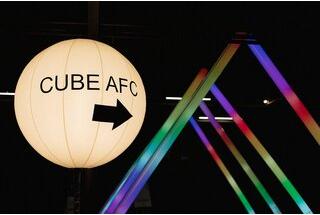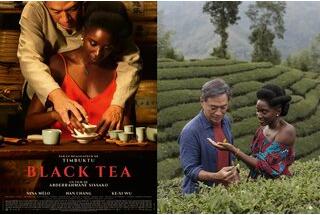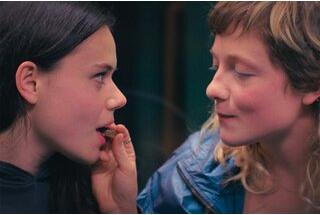Julien Poupard, AFC, Twixt fairies and loonies
by Ariane Damain Vergallo on behalf of Ernst Leitz WetzlarSummer. The time of the year when he felt really happy, right where he belonged. His first Good Fairy was…his mother. She spurred him to higher education even though his distaste for school made it necessary to shorten his time there. As luck would have it, she was a career counsellor and thus helped him apply for all of France’s audiovisual BTS institutions (BTS=advanced technician’s certificate), counting on the fact that the sheer number of applications just might play in his favor.
As soon as he got his BTS, Julien Poupard expressed the desire to try and pass the exam to get into France’s most prestigious film school to, The Fémis. An entrance exam one can compete for only three times. Three opportunities ? Not too shabby, he thought. At least, worth a try.
For that year’s Fémis exam, one had to put together a dossier on traces. Julien Poupard chose to show the wrinkles on his grandfather’s beloved face, the traces of his smile. Yes, the very same grandfather who lived in his house, a former bookseller who adored cinema and passed his love of words, stories and images on to him.
At the final oral exam, convinced his entire life was at stake, Julien Poupard threw himself into the battle with the temerity of the shy. The jury was presided by director Olivier Assayas who had cheerfully encouraged the young man.
Slowly but surely, Poupard got the feeling that he was captivating his audience and that success was within reach. Then came the last question, about the black and white photo he had just taken of the jury. Why the choice of black and white ?
Why indeed ?
Racking his brain, the young man finally dealt the decisive blow : he just pointed at the horrendous salmon-pink blouse worn by one of the jurors, a screenwriter. That did it, the entire jury burst out laughing… Welcome to the Fémis.

To be twenty, to be accepted at the Femis, to leave home and live in Paris… a four-tier dream. "Absolute bliss." Young Julien threw himself headlong into the task of finding a job and got an ambulance driver’s license. Easy to obtain at the time – too easy, which to this day still makes him wary of that profession.
His employer specializing in psychiatry, Julien Poupard spent the next four years (the duration of his studies at the Fémis) carrying mentally-impaired people – “loonies” as they are sometimes called – on Saturdays as well as Sundays, often throughout the night, then segueing onto lighting classes… A cultural smashup, to say the least.
He still remembers the « loonies’ » stares piercing his very soul. They were not bound or hindered in any way (the law forbids it) and as the effect of the tranquilizing shots waned, he had to watch them even more closely.
For more than once, taking advantage of a traffic jam or a drop of attention on his behalf, some would dash out of the ambulance and try to disappear into the forest.
Dare we imagine the young student running as fast as he can on their trail, catching up with them, overpowering them and bringing them back into the ambulance ? And dare we think that, strangely but undoubtedly, those four years spent in the company of « loonies » were an invaluable preparation for him to face the turmoil of temperaments that are unleashed during the making of a film ?
His four years at The Fémis also taught him that shy people can be geniuses when it comes to light. He remembers how silent cinematographer Bruno Nuytten remained as, every morning, he paced the large set at The Fémis, not knowing what he was going to do, turning a spotlight on then turning it off… As he watched him proceed, Julien Poupard discovered that doubt did not necessarily dwindle with age. Quite the opposite, in fact : when combined with humility, it could be a creative driving force.
After graduation, Poupard went through a series of internships with various equipment rental companies and discovered sheer technique was not his forte. However, he somehow managed to become second camera assistant to cinematographer Yves Cape, who quickly realized that far from being a “mere” camera assistant, Poupard might possibly be an ideal partner. So he kept him as part of his crew on several films, for the sheer enjoyment of talking with him about films and shots, analyzing an image and watching dailies together. An incredible generosity that one never forgets and that affects one for the rest of one’s life, both professional and personal.
Poupard then worked on nearly forty shorts - as cinematographer, having decided once and for all to bypass the assistant position. He learnt his craft as he went along, recapturing the pleasure and freedom of those summers when he was shooting small movies with his childhood chums.
His tenacity paid off and he had already lined up several feature films to his credit when, at 33, three good fairies barged into his life, swooping him in their wake and leading him to new heights. He could not imagine then that not one but two Golden Camera Awards would crown his work and that his films would travel around the world.
Claire Burger, Léa Fehner and Houda Benyamina constituted that good-fairies trio. Three young directors who sensed Julien Poupard’s talent, appreciated his capacity to listen and the modesty he put at the service of their films. "I was just lucky to meet filmmakers who will definitely matter. » Lucky, really ?
In 2013, Poupard shot Claire Burger’s Party Girl. First Golden Camera, first wonderment. Could a career as full-fledged cinematographer really be possible ? The following year, came Léa Fehner’s Les Ogres, which was unanimously hailed by the critics.
Finally, during a chance meeting in a café (how many projects actually started that way ?), Houda Benyamina offered him to work on her first feature, Divines. It was a no-budget film that took place in the suburbs, but Poupard immediately took her up on her offer because he liked the script and the precise and original portrait Houda Benyamina drew of said suburbs was galaxies away for the usual clichés.
But nothing went on as planned. Some unforeseen event forced the producer to delay the shoot. Common sense would have demanded him to come up with another project – just to make ends meet - but he ultimately decided to follow his instinct and wait for Divines. "I was where I should be, it was the film I wanted to do," says Poupard.
Divines won the Golden Camera at the 2016 Cannes Film Festival and three Césars the following year. A beautiful, strong and moving film that will reverberate right across the Atlantic.
Julien Poupard has just completed principal photography on Pierre Salvadori’s En Liberté, starring Adèle Haenel and Pio Marmaï. For once, it’s not a "first film" and the director is older than he is. More experienced, too. Despite the complexity of the shoot, Poupard only remembers the shared pleasure of making pictures together.
He had already tried Summilux-C lenses on commercials. "I liked them a lot." The budget for En Liberté finally gave him the opportunity to use them on a feature film. Their 1.4 T-stop allowed for night shoots at a funfair practically without any additional lights, resulting in "a really interesting fuzziness and a feeling of both sharpness and softness". Along with the compact and lightweight Summilux-Cs, he chose the Alexa Mini to frame it all in super 35 scope. "A simple configuration, which I like. Keeps it all human".
Poupard, whose filmography is split equally between male and female directors, finds those categories ultimately irrelevant, especially for artists and creators at large.
In that sense, he belongs to the future of cinema.
He gleefully quotes a director who once was desperately looking for a female cinematographer for his next project but none was available. So he turned to Poupard : "I did not find the right woman, so I might as well fall back on you ! »
Poupard was not offended, he just smiled and quietly acquiesced. Something to do with fairies and loonies, perhaps ?
(Translated from French by Henri Béhar)
 En
En Fr
Fr





